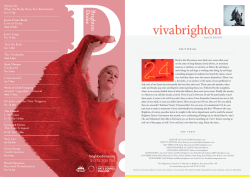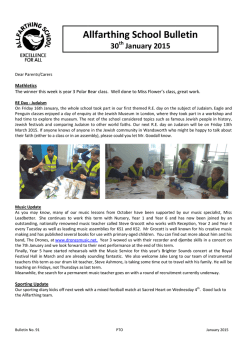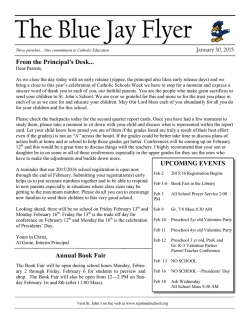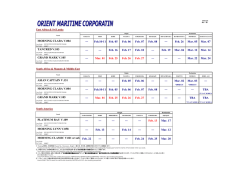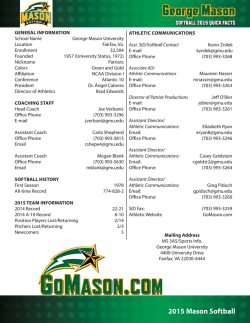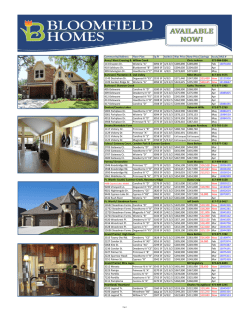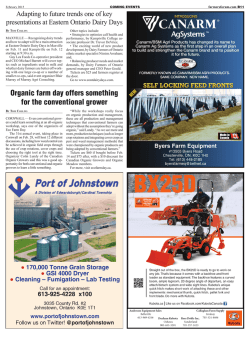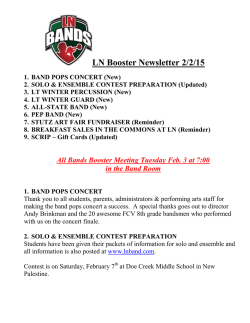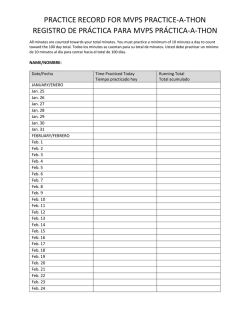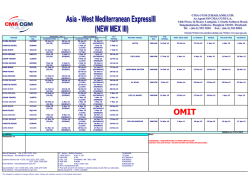
Syllabus - Caltech
Ph/EE/BE/APh 118B − Winter 2015 Physics of Measurement Tu, Th 2:30-3:55pm / 57 West Bridge Make-up Lecture Times: Friday 2:30-3:55pm Prof.: Michael Roukes, x2916, 131 Bridge Annex ([email protected]) T.A.: none Admin.: Bonnie Leung, x2933, 127 Bridge Annex ([email protected]) Class URL: http://www.its.caltech.edu/~ph118/ — COURSE INFO — This course will provide an introduction to the concepts and principles of physical measurements that are crucial to experimental research. This is stuff that I want all of my own research group members to know well. Topics surveyed include signal domains and transduction, responsivity, backaction, physical noise processes, bandwidth and information, nonlinearity, frequency conversion, modulation, synchronous detection, signal-sampling and time-domain methods, digitization, signal transforms, and multiple-measurement correlations. Where possible, discussion will be formulated around current approaches that provide state-of-the-art sensitivity. Possible examples may include quantum interference devices, bio/chemical sensors, photonic devices, and micro- and nanomechanical systems. 1. Prerequisites. This is a class for those embarking upon careers involving laboratory measurements. It is primarily designed for beginning graduate students in the physical and engineering sciences, however others are welcome. The class will make most sense to you, and be of obvious relevance, if you’ve already had some exposure to laboratory research involving hands-on physical measurements. Undergraduates who are involved in laboratory research may, with a note of recommendation from their research advisor, also take this course. The official prerequisites are Analog Electronics (e.g. Ph105) and Statistical Mechanics (e.g. APh105 or Ph127) … but I’ll say, unofficially, there are no prerequisistes but the desire to learn and a willingness to ask questions in class. However, in my lectures I’ll assume you’re familiar with basic circuit theory and electronics, as well as Fourier analysis, auto- and crosscorrelations, and concepts like spectral densities, etc. You’ll probably find it a hard go without some knowledge of these. Class topics will be discussed from the context of solid state physics; previous coursework in this are will be helpful. With sufficient interest, the TA may schedule a tutorial or two on such background topics. 2. Required Textbooks None – but there will be lots of good stuff for your perusal on the class web site. purchase a book like Horowitz & Hill, if you don’t already have it (see below). I strongly recommend you 3. Reserve Books “The Art of Electronics”, 2nd Edition, Paul Horowitz & Winfield Hill, TK7815 .H67 (1989) “Low Noise Electronic System Design”, C.D. Motchenbacher & J.A. Connelly, TK7867 .M69 (1993) Additional items will be posted on Ph/EE118 web site. Version 7 / 1 February 2015 Ph/EE/BE/APh 118b – W 2015 / v. 7 p. 2 4. “General Philosophy”, Grading, Exams, and Expectations (mine) This class, held in somewhat of a “seminar” format, is intended as a resource to help build your knowledge base for current and future laboratory investigations. Hence, your grade is really the least important element of the class. • The class is offered only for a letter grade. Final grades will be based on student performance in the following areas: 30% class participation, 30% homework, 30% final exam. • Class participation from students is mandatory; so come prepared and be forewarned – following the Socratic method, I will often ask unsolicited questions of each of you in class. • Readings will be assigned and form essential part of the course learning along with the homeworks. • I expect your participation; and you will not pass this course if you do not attend all the lectures (this is a seminar-like class) and if do not actively participate in class. Furthermore, it is not likely you’ll have sufficient understanding of the material to pass the exams without attending class, keeping up with the readings, and reviewing the class notes. • Depending upon inchoate factors there could be both mid-term and final exams. 5. Homework… will be assigned on a weekly basis. Mid-term and final exam questions will most likely be similar to homework topics. 6. Web Site. I will post lecture notes, reading material, and supplementary information on the Ph118 web site. You’ll need the password (given in class) to access these materials. For economy of size these documents will be encoded in .pdf format. You’ll need Adobe Acrobat to read the .pdf files. The reader can be downloaded free at: http://www.adobe.com/prodindex/acrobat/readstep.html 7. (Approximate) Syllabus. As follows… (but there are always minor adjustments and optimization in mid-stream). * FRIDAY LECTURE Ph/EE/BE/APh 118b – W 2015 / v. 7 p. 3 Lec. Date 1 Tu 6 Jan 2 Tu 13 Jan Lecture 2: Real Components 3 Th 15 Jan Lecture 3: Spectrum Analysis 4 Th 29 Jan Lecture 4: Network Analysis, I *5 Fr 30 Jan Lecture 5: Network Analysis, II 6 Tu 3 Feb Lecture 6: Network Analysis, III 7 Th 5 Feb Lecture 6: Impedance Matching *8 Fr 6 Feb Lecture 7: Filters in the time and frequency domains 9 Tu 10 Feb Student Lecture 1: Caryn Bullard Phase noise mechanisms and limits to mechanical sensing 10 Th 12 Feb Student Lecture 2: Jarvis Li Nanomechanical mass sensors: ultimate and practical sensitivity limits * FRIDAY LECTURE Principal Topics Lecture 1: Organizational Meeting Reading Materials Ph/EE/BE/APh 118b – W 2015 / v. 7 p. 4 Lec. Date *11 Fr 13 Feb Student Lecture 3: Joe Redford Photonic neural nanoprobes: ultimate and practical sensitivity limits 12 Tu 17 Feb Student Lecture 4: Trevor Fowler Nanophotonic chemical sensors: ultimate and practical limits 13 Th 19 Feb Student Lecture 5: Adam Neumann Multimode NEMS inertial imaging: scaled-up system limits *14 Fr 20 Feb Student Lecture 6: Gustavo Rios Electrical neural nanoprobes: ultimate and practical sensitivity limits 15 Tu 3 Mar Student Lecture 7 Quinn Osha Light Sheet & Lattice Light Sheet Microscopy 16 Th 5 Mar Student Lecture 8: Deepan Kishore Nanoplasmonic chemical sensors: ultimate and practical sensitivity limits *17 Fr 6 Mar Student Lecture 9: Luciana H.P. Cendon Ultrasensitive FM detection of RF nanomechanical motion 18 Tu 10 Mar Student Lecture 10: Mehmet Sencan Amperometric chemical sensing: ultimate and practical sensitivity limits 19 Th 12 Mar Student Lecture 11: Andrew Janzen SQUIDs: applications & ultimate and practical sensitivity limits 20 Fr 13 Mar Student Lecture 12: Peter Hung Two-dimensional inertial imaging with NEMS * FRIDAY LECTURE Principal Topics Reading Materials Ph/EE/BE/APh 118b – W 2015 / v. 7 p. 5 Winter Term 2015 / Lecture Calendar * FRIDAY LECTURE
© Copyright 2026
